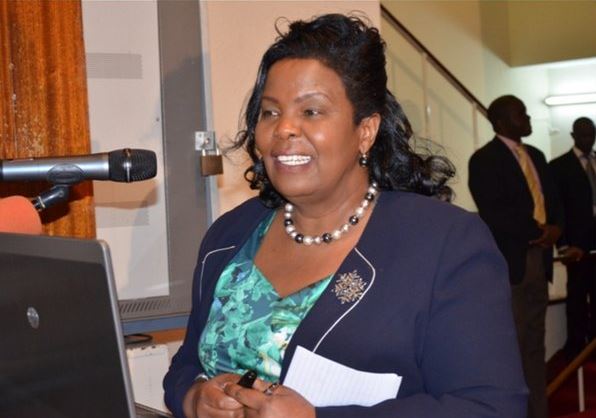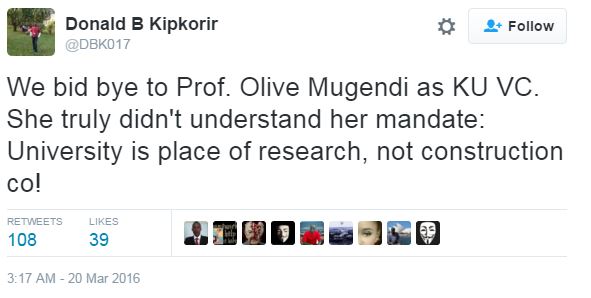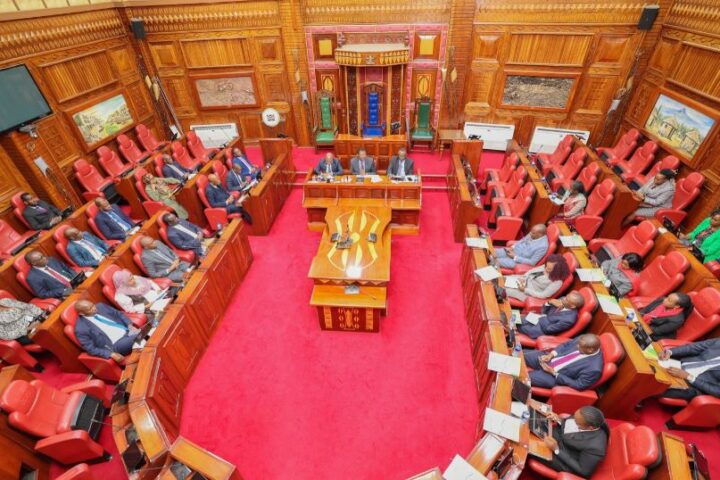
Some Kenyans have a peculiar habit of playing down other people’s success when it does not benefit them personally. Others blatantly fight to bring you down when the only mistake you did was succeed.
Prof Mugenda retired last week as Kenyatta University Vice Chancellor, and a lot of people are questioning her achievements.
Lawyer Donald Kipkorir wrote on Twitter, “We bid bye to Prof. Olive Mugendi as KU VC. She truly didn’t understand her mandate: University is place of research, not construction co!” Lawyer Ahmednassir Abdullahi agreed with him.
When he says ‘construction co’, he’s obviously referring to the many new buildings constructed at KU’s main campus in the last decade.
But for a person who says to be learned, that way of thinking is disappointing.
Without even thinking hard, where exactly does research take place? In open dusty fields?
Because most of KU was exactly that when Mugenda took over.
Just to answer those who keep mentioning research, Mugenda built two multi-storey science laboratories.
She built the largest Library of any University in Kenya, and stocked it with books and computers.
She built several computer labs, the largest having 800 computers connected to the internet.
She built the KU funeral home, closed to the public on some days for use by medical students.
She built the KU referral hospital and KU children’s hospital, to provide actual field work for medical students.
She built a new school of engineering and two engineering labs, with some electronic equipment costing tens of millions.
So what exactly does research mean to those taking this opportunity to humiliate her? Aren’t those the very places research takes place?
Many will cite the Unicity Mall and petrol station opened the other day, but fail to tell you that those two latest additions to KU were not financed with University money.
KU merely provided the land and will reap economic benefits for many years.
Again, when Kipkorir and co. mention research, they are also probably talking about publications and research papers.
The funny thing is that they can not mention a single research paper from any other institution.
As with human nature, a research paper will make far less headlines than a new building.
However, what they don’t know is that the number of professors at KU has increased, and so is the number of academic papers and actual research.
KU is now admitting the most university students in Kenya and this includes Masters and PhD students.
For someone to say that research publications have gone down, they need to understand that it is a mandatory element from Masters upwards. How then it has gone down when the student number has gone up is beyond logic.
People fail to point out that just a few years ago, KU was merely a teachers’ training centre, with education being the largest course by far. Actually, most teachers in Kenyan high schools with over a decade experience went to KU.
In recent years, new courses have been introduced; the likes of law, medicine and engineering.
Despite being an infant in some of these fields, KU now has better engineering labs than JKUAT, better medical training infrastructure than UoN, an arguably better equipped law school than UoN, a world class hotel to train tourism and hospitality students better than any other college or university and recently a functional TV station to give media students real-life experience while still in campus.
Another issue often cited is the lecturer to students ratio.
Some classes have upwards of 200 sometimes 300 students. This is the case in highly populated courses like Education and Economics, and rarely in Engineering and Medicine.
While improvements can be made in this area, KU is no different from every public university in Kenya in this regard. And to be fair, this is a nationwide crisis right from primary schools where in some schools teachers handle hundreds of pupils.
Those who have never stepped into an worthwhile university do not know this, but student welfare is very important in maintaining the peace and tranquility.
Mugenda did quite a lot in this sector: Several new hostels, a student business centre with banking halls and restaurants, several food points scattered across the university, WiFi now covering most areas, a new modern medical clinic, student shuttle buses, an alcohol centre etc.
The formerly frequent strikes by KU students are a thing of the past.
Buying lab equipment, building lecture halls, hostels, etc. is an expensive affair, and balancing between putting all your revenue in recurrent wage bills like hiring more lecturers, or building infrastructure is a tricky affair.
Because of Mugenda’s work, public university slots have increased greatly and people who would otherwise be at home or in lower level colleges now have a chance to get University education.
Mugenda’s decade in charge should be analyzed side by side with achievements of other Vice Chancellors of public universities.
To be fair, there is little difference between the JKUAT of 10 years ago and the JKUAT of now; and the University of Nairobi of 10 years ago and University of Nairobi of now.
“Mgala muue, lakini haki mpe.”
And finally as much as everyone will not mention it, Mugenda moved Kenyatta University from the ignoring stage, to the hating stage (this is where Kipkorir, Ahmednassir and Robert Alai come in). The next stage is accepting the new Universities’ hierarchy and moving on.
Have your say. Do you think Mugenda’s tenure was a failure?







